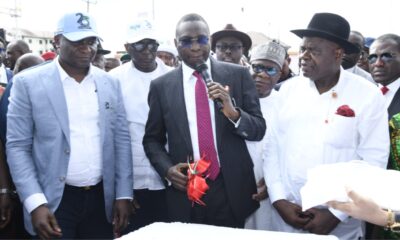Business
SNEPCo Projects Gas Shortage By 2030 …Says FDI Key To Africa’s Gas Reserve Dev
The Managing Director of Shell Nigeria Exploration and Production Company (SNEPCO) Limited, Elohor Aiboni, has projected that Nigeria will have a three billion cubic feet per day gas supply shortage by 2030.
Speaking at the 2023 edition of the Annual Conference of the Nigerian Council of the Society of Petroleum Engineers held in Lagos, over the weekend, Aiboni said despite having the largest proved gas reserves in Africa, “Nigeria could see gas demand outstripping gas supply by 2030 by at least three billion cubic feet per day”.
Represented by the Finance Manager, SNEPCO, Tunde Oduwole, Aiboni said the gas supply shortage would be driven by an estimated increase in population, dwindling infrastructure, security climate and access to energy.
She advised Nigeria and other African countries to continue to improve on fiscal terms, the political climate, energy policies and contractual terms to make them attractive to investors and energy companies.
The SNEPCo boss, who noted the huge amount of capital required for gas reserve development, urged African countries to take deliberate steps to attract Foreign Direct Investment(FDI) to harness their vast gas resources.
She urged the continent to put in place liberal trade, fiscal policies and a stable social, political and economic environment, to attract investments in its gas sector.
Aiboni said while Africa’s oil and gas sector promised opportunities for FDI, such capital would “preferentially go to countries with more stable macro-economic policy environment, low or moderate inflation, stable interest rates, stable or predictable exchange rates, easy access to foreign exchange and minimal capital controls”.
Referring to recently published statistics from the United Nations Conference on Trade and Development, Aiboni said there was a decline in FDI in Africa from $80 billion in 2021 to about $45 billion in 2022.
The situation, she said, indicated a worrying gap in investments as developing countries worked to achieve the Sustainable Development Goals by 2030.
According to him, the inflow of FDI had been impacted by global commitments to reducing greenhouse gas emissions, and the drive by hydrocarbon resource-poor countries to reduce dependence on fossil fuels and accelerate the development of renewable energy.
“It is imminent now more than ever that oil and gas producing countries in Africa take actionable steps to create enabling environments, improve access to available capital pools, and attract the right skills and capabilities that could both meet the energy needs of our developing populations and position us strongly in a new energy landscape”, she said.
Business
NPA Assures On Staff Welfare
Business
ANLCA Chieftain Emerges FELCBA’s VP
Business
NSC, Police Boost Partnership On Port Enforcement
-
Niger Delta3 days ago
ISOPLOT Has No Legitimacy to Speak for Isoko, INYA Warns
-

 News2 days ago
News2 days agoRSG Tasks Farmers On N4bn Agric Loan ….As RAAMP Takes Sensitization Campaign To Four LGs In Rivers
-
Opinion3 days ago
Benue Conflicts, Hope At Last?
-
Business2 days ago
NCDMB Charges Host Community Youths On Relevant Skills Development … As Promoters Handover Oloibiri Oil Museum
-
Sports3 days ago
Ronaldo Renews Stay With Saudi Pro League
-

 Features2 days ago
Features2 days agoBetween EFCC And NDDC: Strategic Alliance For Niger Delta
-
Niger Delta3 days ago
EFCC Praises NDDC’S Performance … Unveils Projects In Bayelsa
-

 Politics2 days ago
Politics2 days agoMakinde Renames Polytechnic After Late Ex-Gov

